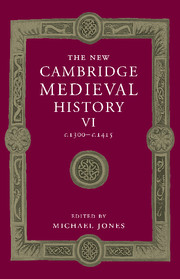Book contents
- Frontmatter
- Part I General Themes
- Part II The States of the West
- Part III The Church and Politics
- Part IV Northern and Eastern Europe
- 21 Baltic Europe
- 22 The Kingdoms of Central Europe in the Fourteenth Century
- 23 The Principalities of Rus’ in the Fourteenth Century
- 24 The Byzantine Empire in the Fourteenth Century
- 25 Latins in the Aegean and the Balkans in the Fourteenth Century
- 26 The Rise of the Ottomans
- 27 Christians and Muslims in the Eastern Mediterranean
- Appendix Genealogical Tables
- Primary Sources and Secondary Works Arranged by Chapter
- Index
- Frontispiece
- Plate section
- Map 4 Europe's trade, c. 1300
- Map 5 Europe's trade, c. 1400
- Map 7 The Hundred Years War to 1360
- Map 15 Russia, c. 1396
- Map 17 The Byzantine empire in the 1340s
- References
23 - The Principalities of Rus’ in the Fourteenth Century
from Part IV - Northern and Eastern Europe
Published online by Cambridge University Press: 28 March 2008
- Frontmatter
- Part I General Themes
- Part II The States of the West
- Part III The Church and Politics
- Part IV Northern and Eastern Europe
- 21 Baltic Europe
- 22 The Kingdoms of Central Europe in the Fourteenth Century
- 23 The Principalities of Rus’ in the Fourteenth Century
- 24 The Byzantine Empire in the Fourteenth Century
- 25 Latins in the Aegean and the Balkans in the Fourteenth Century
- 26 The Rise of the Ottomans
- 27 Christians and Muslims in the Eastern Mediterranean
- Appendix Genealogical Tables
- Primary Sources and Secondary Works Arranged by Chapter
- Index
- Frontispiece
- Plate section
- Map 4 Europe's trade, c. 1300
- Map 5 Europe's trade, c. 1400
- Map 7 The Hundred Years War to 1360
- Map 15 Russia, c. 1396
- Map 17 The Byzantine empire in the 1340s
- References
Summary
the Rus’ principalities in the fourteenth century were not ‘Russia’, although their history in this century is often subsumed into that rubric. The state centred at Moscow that became Russia emerged from one of the Rus’ principalities over the course of the century. During the 1300s political and cultural diversity was the dominant feature of these lands in the eastern reaches of the forested European plain. The territory with which we will be concerned lies east of Poland and Prussia, stretching to the Urals and extending from the Baltic to the steppe north of the Black Sea. Ethnically East Slavs predominated, gradually displacing the Finno-Ugric peoples native to these forests. Finno-Ugric peoples remained the dominant population in Estonia and the lands north of Moscow and Novgorod, reaching to the White Sea. Balts (Letts, Lithuanians) lived on the Baltic littoral south of Estonia and somewhat inland. Indigenous Siberian peoples lived on the far northern shores of the White Sea. By 1300 only the East Slavs were officially Christian, belonging to the Byzantine Orthodox faith. Surrounding this large area were peoples of different religions, ethnicities and historical heritages: polytheistic Tatars and Turks in the steppelands to the south and east, Catholic Poles to the west.
- Type
- Chapter
- Information
- The New Cambridge Medieval History , pp. 764 - 794Publisher: Cambridge University PressPrint publication year: 2000

